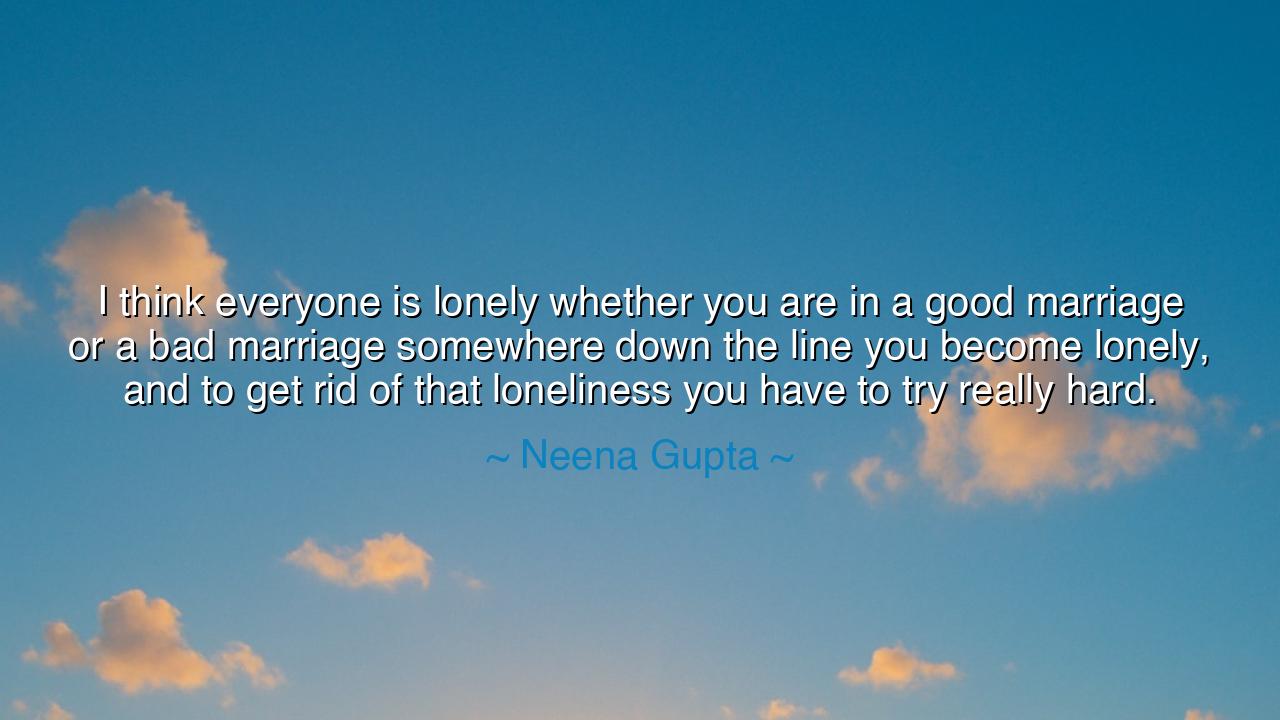
I think everyone is lonely whether you are in a good marriage or
I think everyone is lonely whether you are in a good marriage or a bad marriage somewhere down the line you become lonely, and to get rid of that loneliness you have to try really hard.






The words of Neena Gupta, “I think everyone is lonely whether you are in a good marriage or a bad marriage. Somewhere down the line you become lonely, and to get rid of that loneliness you have to try really hard,” are soft and sorrowful, yet profoundly wise. They are not the lament of despair, but the confession of one who has lived deeply and observed truth without illusion. In this reflection, Gupta touches the ancient paradox of the human heart — that even in the closest of unions, there remains a solitude that no other can completely fill. Marriage, for all its warmth and companionship, cannot erase the fundamental mystery of being an individual soul, walking its own unseen path. Her words remind us that loneliness is not always the absence of love, but the echo of our longing for something even greater — connection that transcends the limits of flesh, time, and understanding.
In the long history of love, poets and philosophers have whispered the same truth. The ancients called it the “solitude of the soul.” Even in the arms of a beloved, they said, one remains partly alone, because every human being carries within them a secret world — thoughts that cannot be spoken, fears that cannot be shared, dreams that live and die unseen. Neena Gupta, speaking from her own life of courage and independence, gives voice to this universal condition. She reminds us that marriage is not a cure for loneliness; it is another form of it — a mirror that reflects not only love, but also the limits of understanding between two beings. To live together is to discover, sooner or later, that closeness does not always mean communion, and that true connection must be cultivated again and again, like a flame that flickers and must be tended lest it die.
Her words are born from experience — from a life lived both within and outside of convention. Neena Gupta, an actress and artist of fierce individuality, has known both solitude and companionship. She speaks not with bitterness, but with realism softened by compassion. In India, where the ideals of marriage are often wrapped in duty, tradition, and expectation, her honesty pierces like clear light through cloud. She tells us that loneliness is not a sign of failure in love; it is the condition of being human. Whether one is married or single, successful or struggling, the ache of loneliness visits all — for no person, however beloved, can fill every space within another’s soul.
The ancients too understood this truth. Marcus Aurelius, the philosopher-emperor, wrote in his meditations that “a man’s life is what his thoughts make of it,” for even in the company of many, one can feel alone if the heart is unanchored. And yet, he also said that it is within one’s own power to transform solitude into strength. Gupta’s teaching aligns with this wisdom — for she adds, “to get rid of that loneliness you have to try really hard.” The effort she speaks of is not desperation, but discipline. It is the work of connection — the conscious choice to reach out, to listen, to forgive, and to love again, even when the glow of intimacy fades into the quiet rhythm of ordinary life.
We can see this lesson in the lives of many who endured the loneliness of love and yet turned it into grace. Consider Eleanor Roosevelt, who spent much of her marriage emotionally distant from her husband, yet transformed her solitude into compassion for others. Her pain became the source of her greatness. She once wrote, “You gain strength, courage, and confidence by every experience in which you really stop to look fear in the face.” So too does Gupta’s reflection invite us to face the fear of loneliness — not to run from it, not to blame our partners or fate, but to use it as a mirror to understand ourselves more deeply.
Loneliness in marriage is not a curse, but a summons — a call to awaken. It asks us to see our partners not as saviors, but as companions on a shared yet separate pilgrimage. It teaches that love must be chosen, not once, but daily — through kindness, through listening, through the hard labor of empathy. In this way, loneliness becomes not an emptiness to be escaped, but a space in which greater love can be born. The soul that accepts its solitude learns how to love freely, without the chains of expectation.
Let this be the lesson of Neena Gupta’s words: do not fear loneliness when it comes, for it is a teacher in disguise. The one who dares to face it, who “tries really hard” to reach beyond it, discovers that love — true love — is not the merging of two beings into one, but the meeting of two souls who, even in their separateness, choose to walk together. The wise understand that the heart’s deepest companionship is not the absence of loneliness, but the courage to love in its midst.
Thus, her quote becomes a timeless meditation: even in the warmth of marriage, remember the quiet work of the heart. Seek not the end of loneliness, but the birth of understanding through it. For to be human is to be both connected and alone — and to transform that loneliness into tenderness is the highest art of love.






AAdministratorAdministrator
Welcome, honored guests. Please leave a comment, we will respond soon